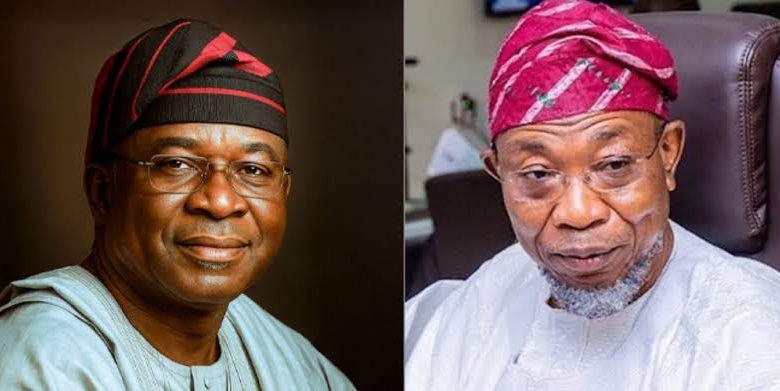
The recent appointment of new interim leaders in the African Democratic Congress (ADC) has raised questions regarding adherence to the party’s constitution.
The party’s longtime National Chairman, Chief Ralph Nwosu had last week stepped down, making way for former Senate President David Mark, who was announced as interim National Chairman. Also named were former Interior Minister Rauf Aregbesola as interim National Secretary and former Sports Minister Bolaji Abdullahi as interim National Publicity Secretary.
The event, which drew prominent coalition figures including former Vice President and Coalition Coordinator Atiku Abubakar, alongside several ex-governors and ministers, has drawn scrutiny from both within and outside the party.
Critics cite potential violations of the ADC constitution regarding both leadership transition procedures and eligibility criteria.
According to Article 23, Clause 4 of the ADC Constitution, “If a vacancy arises in any party office, the appropriate Executive Committee shall appoint a replacement from the same zone or constituency as the outgoing office holder. This appointment is to remain in effect until a new election is conducted at the next congress or convention.”
Chief Nwosu hails from the Southeast, while Mark is from the Northcentral. Similarly, Aregbesola is from the Southwest, whereas the immediate past secretary, Sa’id Baba Abdullahi, is from the North.
Observers also note that there was no record of a National Executive Committee (NEC) meeting preceding the announcement of the new interim officers, as would typically be required under party rules.
Further concerns centre on a constitutional provision that requires individuals to be party members for at least two years before they can hold national or zonal executive positions. This clause was affirmed by Nwosu himself during the ADC’s October 12, 2022, convention, where he said: “The ADC adopted a key clause requiring new members to spend, at least, two years in the party before they could contest elections or hold office.”
Article 23 also stipulates that, “To be eligible to hold any party position, a member must be in the party for at least two years for National and Zonal offices, and at least one year for State, Local Government and Ward positions,” adding that such members “must not be in arrears of membership dues.”
Article 17 outlines the election process and tenure of national and state officers, stating in subsection 1(a) that, “All National and state officers of the party shall hold office for a period of four years at the first instance and thereafter be eligible for re-election for a second term of four years.” Subsection 1(c) states that all elections “shall be done at the appropriate convention and congresses of the party.”
Clause 3 under Article 23 also notes that elected officers must submit a 30-day written resignation notice before vacating office, except where such resignation is tied to contesting an elective position.
Despite the high-profile nature of the takeover announcement, sources within the party disclosed that the Independent National Electoral Commission (INEC) had not been officially notified of the leadership change at the time. However, two letters were reportedly sent by Nwosu and the former secretary, informing INEC of a scheduled NEC meeting for July 29 and a planned primary election for August 16 ahead of upcoming by-elections.
In response to criticism, Nwosu defended the appointments, citing recent amendments to the party constitution to accommodate the new political reality under the coalition arrangement. However, this position was challenged by the outgoing National Publicity Secretary, Musa Matara.
Matara argued that the constitutional amendment process must be participatory and transparent, saying: “The amendment of a constitution is not something a small group of people can just do to suit their interests. It requires a public hearing… and the involvement of stakeholders.”
He further questioned the timing and intent of the amendments, noting: “If someone says the constitution was amended, the next question is, when exactly was it amended? Was it close to the time the coalition started? What was the purpose of the amendment?”
Matara also stressed that any amendment process must comply with the provisions of the Electoral Act 2022 and must involve INEC. “Before any political party’s constitution can be amended, INEC must be involved and must supervise the process,” he said.
“If they claim it was amended, they must tell us the exact date and month it happened. They mentioned the 15th of May, but that was exactly when talk of the coalition began,” he added.
In defence, Nwosu insisted that the processes were carried out with integrity and expert guidance. “We have never been a party of loose politics,” he said. “We are not even in government, yet we hold ourselves to the highest standards.”
He further added, “If a leader steps aside for the greater good, that is not a weakness but a show of maturity. We welcome new people, and we agree on conditions. Our party is built on patronage, inclusion, and sovereign leadership.”
Dismissing critics who claim that the constitution amendment was rushed, he said, “Why are people so scared of change? Why should the restructuring of a political party cause such panic?”

The beggining of the end.
They are scared and looking for faults to cause crisis but God will put them to shame.